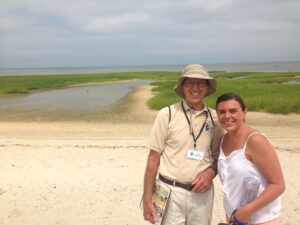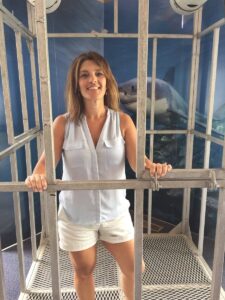Teacher-in-Residence Program Yields Stronger Lessons Grounded in Real-World Application
The Cape Cod Regional STEM Network brings together educators, school districts, business and industry partners, and community members who share a commitment to inspiring and supporting young people’s interest and achievement in STEM learning and careers.
This summer, the Cape Cod Regional STEM Network completed the second year of the Teacher-in-Residence Program. The program is geared toward teachers interested in exploring STEM beyond the classroom. The program gives teachers an exciting opportunity to experience first-hand some of the many museums, businesses, and nonprofit groups engaged in real-world STEM activities across Cape Cod.
The program had six partner organizations in the Cape Cod and Islands region that hosted Teachers-in-Residence at their sites:
- Atlantic White Shark Conservancy
- Cape Cod Museum of Natural History
- Chatham Marconi Maritime Center
- National Marine Life Center
- SencorpWhite
- Teledyne Marine Systems
The teachers came from across the Cape Cod and Islands region, as well as the Boston area, and teachers were paired to sites they requested. Teachers spent two weeks on-site at the partner organization, where they created a project unique to their interests and the organization’s mission and needs. Teachers collaborated with their host site to define and plan the project deliverables. The Cape Cod Regional STEM Network helped to structure the process by requiring the project deliverables to be authentic, relevant, collaborative, and time-bound.
Within these parameters, the Teachers-in-Residence created site-specific projects that ranged from developing a standards-based math curriculum that can be integrated into study of marine environments, designing a suite of interactive educational displays and materials for use in a travelling STEM exhibit for a science center, creating sets of grade-specific materials making science-based field trip to classroom connections for a natural history museum, and creating a standards-aligned unit for elementary classrooms based on current shark research and tracking methodology being used in Cape Cod waters.
The Teacher-in-Residence Program deliverables provide a valuable resource for the site partners. A new site that joined the program this year is SencorpWhite, a leading advanced manufacturing facility on Cape Cod. Keith Morrison, Vice President of Operations at the company, was uncertain of the program at first.
“To be honest I had my concerns going into it. I was worried that the teacher wouldn’t be able to engage in the short two-week period, that my employees wouldn’t embrace the process, and that it would take up too much of my time. Well, I’m not afraid to admit when I’m wrong.”
Morrison gave the two teachers in residence at SencorpWhite full access to everyone on the floor and the office, and they took full advantage of the opportunity.

“They locked in on the objectives and executed flawlessly,” Morrison stated, “and now SencorpWhite has an enhanced program to engage students during visits as well as bringing manufacturing exercises and activities into the classroom.”
The insights and experience the teachers gained through the Teacher-in-Residence Program had positive and lasting effects as they returned back into their classrooms. Siobhan Curran, a teacher at MA Academy of Math and Science, completed a teacher-in-residence at Teledyne Marine Systems. Based on her experience there, she was able to develop a new engineering curriculum for her students that broke down barriers to student learning.
Curran said, “My students are talking about the engineering process with more confidence than they were at this time last year.” In previous lessons, Curran had some students that could not grasp the ideas being taught. During Curran’s residency, Bob Melvin, Vice President of Engineering at Teledyne, helped her learn tools that she could integrate into her lessons.
“He walked me through how he taught a similar lesson to his engineers. I was able to tweak my approach. This year, the majority of my students identified fishbone diagrams as one of the most useful brainstorming techniques we tried. Furthermore, having the chance to see how Bob taught his engineers about knowledge gap analysis helped me integrate better questions into class discussions.”
These collaborations tie together the creative exchange that is at the heart of innovation. “My experience with the Cape Cod STEM Network helped me develop stronger lessons grounded in real-world engineering principles. The immediate impact on my classes has been tremendous,” Curran said about the program.
After the two-week residencies end, the Cape Cod Regional STEM Network provides additional funding to support a field trip or other related student experiences during the school year ahead.
The Network is looking to expand the Teacher-in-Residence Program this year to attract more participants, include residencies across Cape Cod and the Islands, and add more host sites.
For more information, contact Bridget Burger, Director, at director@capecodstemnetwork.org.
The Cape Cod STEM Network is building a vibrant STEM learning community with the skills to excel at school and in the world of work. In addition to the Teacher-in-Residence Program, the Network has:
- Partnered with over 65 business and organizations who have shared STEM experiences with young people in the community
- Hosted professional development experiences for more than 260 teachers, with programs ranging from one-day workshops to four-day institutes
- Reached over 2,500 students at STEM-focused community events
- Organized career and transfer events each semester to encourage college and college students to pursue STEM pathways
- Awarded over $45,000 in small grants to teachers, faculty, and non-profit educational outreach groups for creating and teaching STEM in exciting ways
For more information visit www.capecodstemnetwork.org. Get to know program leader Kristen Kibblehouse in this profile.

